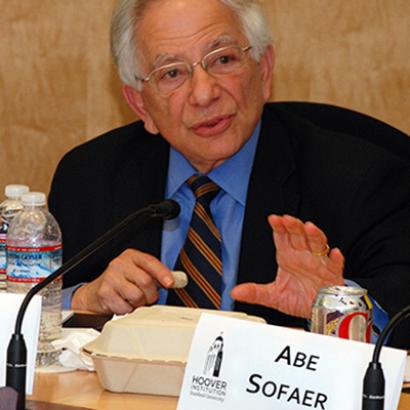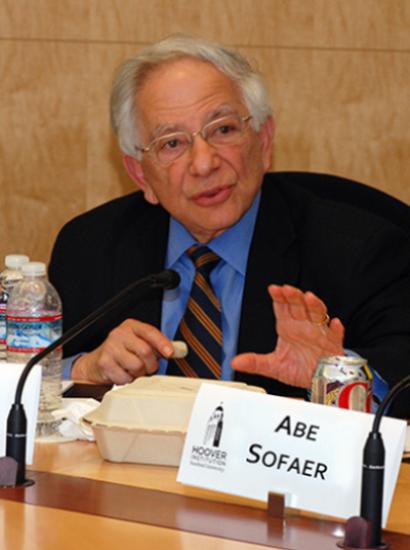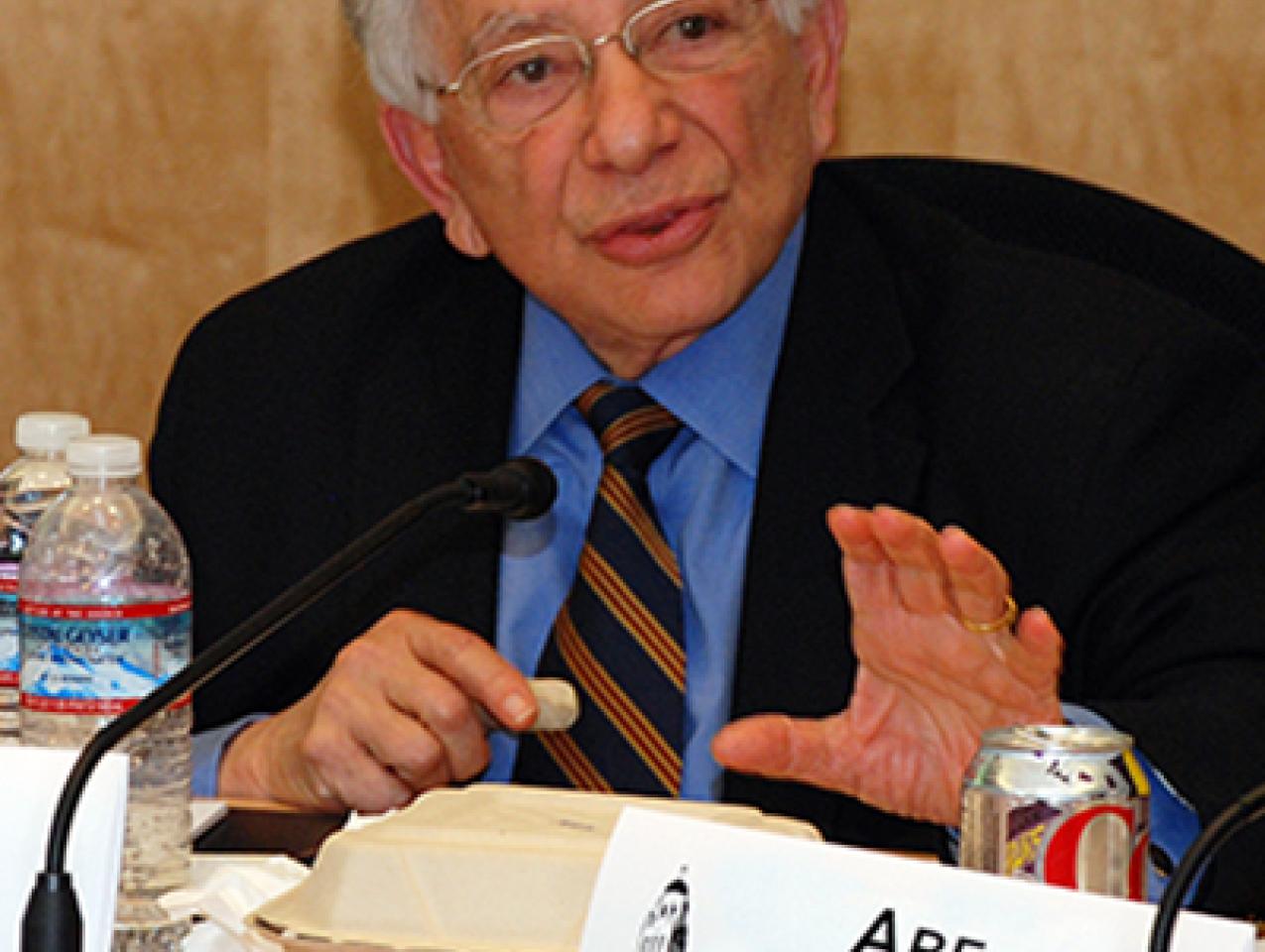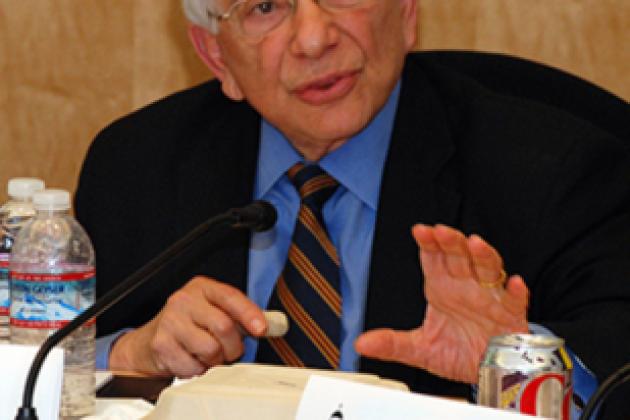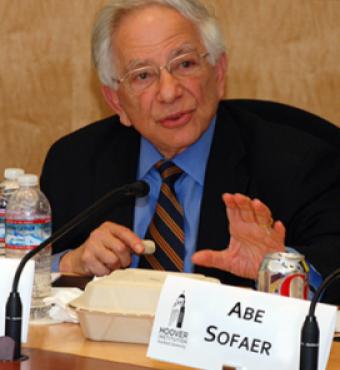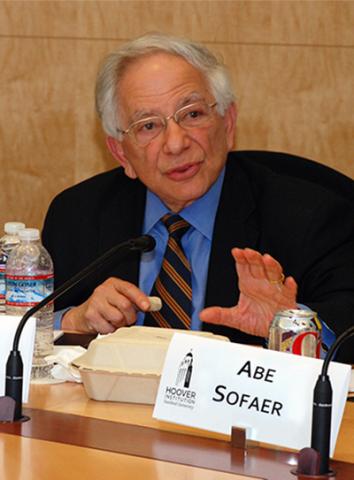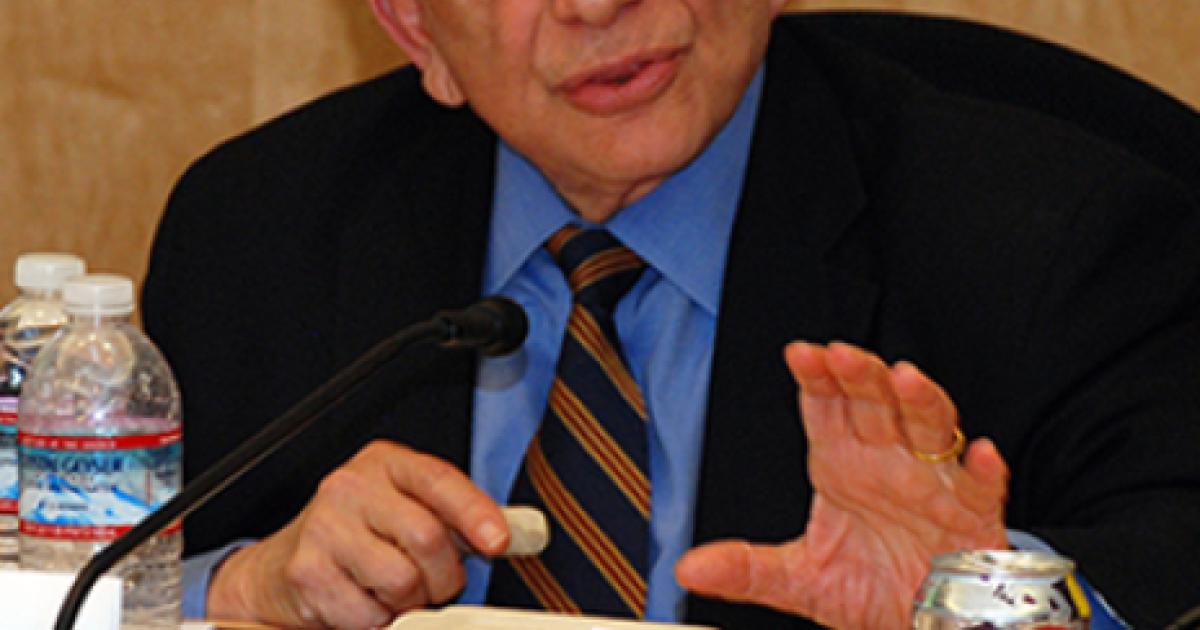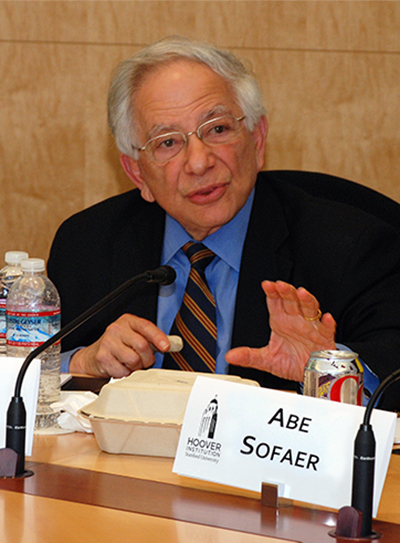
by Jonathan Movroydis
Abraham D. Sofaer is the George P. Shultz Distinguished Scholar and Senior Fellow at the Hoover Institution. He previously served as a US District Court Judge for the Southern District of New York, and Legal Adviser to former US Secretaries of State George P. Shultz and James Baker. He is author of Taking on Iran: Strength, Diplomacy, and the Iranian Threat (Hoover Institution Press, 2013).
How long have you been following Qassim Soleimani?
Sofaer: Ever since US forces displaced Saddam Hussein in 2003. I had heard of Soleimani before, but I was stunned to learn that he was supplying armored piercing rockets to the Shiite militias in Iraq. These rockets were killing many American soldiers.
American policymakers—Republicans and Democrats alike—were doing nothing to offset the impact of Soleimani and the IRGC’s [Iran Revolutionary Guard Corps] actions. I followed Soleimani from then on, because it was very clear to me that he was in charge of the effort under Iran’s constitution to essentially take control of the Shiite crescent in the Middle East—several countries included. He was doing very well in this project because we kept finding reasons not to stop him.
What is the size and scope of the IRGC, and what is the nature of their operations?
Sofaer: The size of the IRGC has expanded over the years, so it is difficult to know how large they are now. They started off as a parallel military and internal national security operation. They were tasked with implementing the Iranian objective of spreading Shiite Islam throughout the world and attacking Iran’s enemies. These enemies were mainly Iranians who left Iran because of the 1979 revolution, and who oppose the regime. The IRGC were so successful over the years that they expanded their influence from being a parallel and relatively small operation overseas to actually becoming bigger and more important than the regular Iranian military.
The Basij Force, which is the force within the IRGC that does the domestic work in keeping the “revolution” “pure”, has taken over important aspects of internal national security in Iran and is charged with enforcing morality. This includes enforcement of modest dress of women, prosecution of blasphemy against Islam, and securing proper public behavior, especially on university campuses.
I see an immediate and direct correlation between the IRGC’s growth and its success. The more the IRGC proves to Ayatollah Khamenei that they have the right ideas and solutions, and that the United States would not respond to their actions either because it was cowardly or it wasn’t willing to have another war, the more influential the IRGC has become. When they bombed the Khobar Towers in Saudi Arabia, President Clinton didn’t respond with force or even sanctions, because he thought that by not responding he could relate better with then Prime Minister Mohammad Khatami. Internally, the IRGC must have told the Ayatollah, “We don’t need Khatami at all. Our policy should be to kill our enemies and increase our influence.”
And where have they increased their influence? If you to stop to think about it, it is amazing how successful they have been. Their early support for Hezbollah, once a small force in Lebanon, has resulted in a situation where Hezbollah not only has a veto power over the Lebanese government but is essentially the most powerful military force within the country.
In Iraq, the United States was right in removing Saddam Hussein but was wrong in thinking that democracy would necessarily flourish as opposed to Shiism. Iran’s influence in Iraq has increased enormously, not only through Shiite militias but in the Iraqi government, which currently is calling on the US to remove what remains of its military forces.
Syria is sympathetic to (and now allied with) Iran because the Assad regime has received support from Iran for many years. Assad—in his support for Hezbollah—has helped extend Iran’s influence through Syria to Lebanon. When the rebels in Syria threatened the Assad regime, Iran joined with the Russians to turn the tide in Assad’s favor, while the United States did nothing. Thus, Iran continues to have enormous influence in Syria. The Iranians are threatening to stay in Syria in a major way, particularly along the border with Israel.
Another piece of the Shiite crescent that Iran has supported is the Houthi rebels in Yemen. The Houthis overthrew an elected government in 2015. If not for the Saudis, all of Yemen would be in the hands of an Iranian ally.
Iran’s efforts remain serious. They have hopes to empower the Shiite minority in Saudi Arabia, and outright attacked the Aramco oil complex on the east coast city of Abqaiq in September 2019. If Iran has their way, other regimes will be potentially undermined unless the United States takes action. Iran is particularly active in attempting to undermine the pro-US government in Bahrain, which is a Shia-majority country.
What is Iran’s ultimate objective?
Sofaer: Iran’s ultimate objective is to spread the word about their interpretation of Shiite Islam, and to substitute their concepts of law, order, and morality in place of those developed in the Western world, which include state sovereignty, international law, and limitations on use of force across borders. Iran is a very grave threat to the civilized order as we know it.
Prior to taking out Soleimani, the United States has never physically attacked an Iranian target since 1986 to 1988, when US forces retaliated against IRGC mining the Persian Gulf and launching missiles at US Navy vessels. The American response then was eminently successful, driving the Iranians away from their bases in the Gulf and destroying much of the IRGC navy. Iran did not act against the United States any further by mining the Gulf or firing missiles. However, Iran subsequently started incrementally misbehaving in the Gulf in a way that threatens regional peace and security. At one point, the IRGC navy seized a British navy vessel and held it for a few days. The British were impelled to act, because they didn’t want to be seen as capitulating to Iran’s misconduct. Iran ultimately released the British sailors, but this wasn’t a great moment for the United Kingdom or the United States.
US policy on the IRGC has generally been about nonconfrontation. This is a big mistake. When the rules of engagement are so respectful of peace and security to a point where we are telling the enemy that they can do almost anything short of actually attacking before we retaliate, they will keep pushing the envelope.
The Soleimani strike is the first time since the US use of force in the Gulf that the United States attacked an Iranian target deliberately. The United States has never physically attacked a target on Iranian soil. Though it is alleged that, in cooperation with Israel, it committed a successful cyberattack in the form of the Stuxnet virus against Iran’s Natanz enrichment plant in 2013.
There still appears to be an understanding within the US national security community (and that of Israel) that the United States (and Israel) won’t physically attack targets within Iran. This gives the regime a lot of comfort in knowing that they will be able to attack US (and Israeli) targets with relative impunity, particularly by using surrogates. This policy may be changing (at least for the United States), because the Trump administration has made it clear that if you send a general to plan new attacks on Americans —and if he is foolish enough to find himself at the Baghdad airport to plan such attacks—US forces may actually act. That is a step in the right direction, but not enough to take on the IRGC effectively.
Why haven’t US policymakers acted until now against IRGC forces?
Sofaer: We have been dumb, ignorant, and weak. You could find a whole host of reasons. People who don’t know how to use power effectively would characterize it as cautious and deliberate. These people don’t know Iran. They don’t know that Iran has consistently acted more aggressively in the face of weakness, and more cautiously and defensively in the face of strength. If you don’t learn from the many examples of these facts, you are not capable of learning. It is inexcusable.
Since 1979, the United States has consistently failed to act with strength and effective diplomacy with Iran. The Reagan administration—though brilliant in its diplomacy with the Soviet Union—was guilty of the Iran-Contra affair, which was one of the most humiliating and absurd events in the history of American foreign policy.
President George H. W. Bush was effective as commander in chief when US forces liberated Kuwait from the Iraqi Army in 1991. In response to this display of American strength, Iran’s leadership accepted a deal with President Bush and helped secure the release of all the Western hostages held in Lebanon. However, the president, perhaps because he was coming up on an election year, never followed through on engagement with Iran by responding to its “goodwill” with “goodwill.” It was a missed opportunity, after a clear signal that American strength had so impressed Iran’s leadership that they were willing to come to the table.
Following the US invasion of Afghanistan in 2001, the Iranians cooperated with the George W. Bush administration on the formation of a new government in Kabul under the Bonn Agreement in December of that year. During the discussions, Iranian diplomats engaged the US ambassador, Jim Dobbins, requesting bilateral talks on issues beyond Afghanistan. The reason why the Iranians were willing to talk was that America had shown strength in Central Asia, and they were concerned about how to effectively deal with a strong America. In this case, the United States rejected that initiative, and perhaps another opportunity at constructive engagement.
Today, I wouldn’t be surprised if the Iranians would be more open to genuine, constructive engagement than they were before the strike on Soleimani.
How does taking on the IRGC complement constructive engagement with Iran over its nuclear program?
Sofaer: It is all important. It is what we have to do. Taking on Iran is taking on the IRGC. The United States needs to demonstrate to the Ayatollah and the other influential segments of the Iranian population and government that the IRGC way is going to be a dead end. We need to show that aggression, cross-border killings, interventions, and the intercontinental ballistic missile [ICBM] program are harmful policies for Iran. If we can’t demonstrate that they are harmful, then Iran will continue using those instruments of power.
In negotiations, taking on Iran means getting its leaders to the table in a meaningful way. The terms should allow for a discussion on all aspects of the relationships between Iran and the United States, and Iran and the rest of the world.
What would be an agreement that would be net-beneficial for all parties involved?
Sofaer: Secretary Pompeo issued a multipoint set of conditions on which the United States would negotiate with Iran. Announcing preconditions is not the way you should negotiate, but Pompeo’s list is sound and reflects the kind of issues we are interested in. You don’t negotiate with another state by saying, “I will sit down with you if you agree to all the things I want to achieve in the negotiation.” That is an insult. I think that getting Iran to change its policies through the use of force is a preliminary step. You still have to engage with a country like Iran just like we had to engage with the Soviets. It is only through negotiation that you can achieve these things.
I think Secretary Pompeo’s list is a very good list. Clearly, we want a commitment not just in the Non-Proliferation Treaty [NPT], but we want a commitment that Iran will demonstrably not attempt to get a nuclear weapon ever. Not just for 10 years, not just for 15 years, but ever! You have to confront them, you have to say to them, “If you were willing to agree to the NPT, just take the words from the original NPT and put it in a new agreement that says that you will never attempt to secure a nuclear weapon, and that you will never enrich uranium beyond a certain percentage, because you don’t need to.”
Why does Iran need ICBMs? They don’t need them for any defensive purpose. The United States won’t attack Iran, unless in self-defense. Iran certainly knows that, in my view.
Beyond the missiles, we need to talk about other issues of great importance relating to intervention in foreign countries and acts of terror that they either engage in or support. Their support for Hezbollah has to be curbed, as does their backing of Hamas in Gaza—a Sunni organization with whom they have created an alliance of convenience based on common anti-Israel sentiment.
Iran has to recognize Israel is a sovereign state and must stop threatening its existence. Conversely, Israel must be willing to engage and settle claims with Iran. Once we have Iran’s attention and their willingness to engage with us, then we have to talk with them across the entire spectrum of each other’s interests.
If you win a confrontation and get someone to the negotiating table, you have to talk about their interests, not just yours. That is the nature of a negotiation. Iran does have commercial interests, they do want a successful economy. There is no harm in seeing a successful Iran.
I don’t think we need to talk about regime change. You are not able to engage a regime and at the same time tell them you want them to go away. You either have to have an agenda with a regime or not. If the regime changes, then so be it. In the Soviet Union’s case, regime change was a gradual process because of a consistent policy of strength and engagement. Eventually, Soviet leaders realized their system wasn’t working. This is the best way to bring about regime change, because war is avoided.
I think if the IRGC’s influence was diminished significantly, there would be a major change in Iran’s policies.
In your expert opinion, was the Soleimani strike legally sound?
Sofaer: Absolutely. I saw no reason whatsoever for US government lawyers to issue statements to try to bring the attack on Soleimani within the traditional and inapplicable standards of self-defense. It is true that when talking about a confrontation between two conventional military forces, there needs to be a degree of imminence to justify an act of self-defense.
However, it has been shown over the past 20 years that there is a legal basis for self-defense against a party who has a record of actions that are of an informal nature, such as committing terrorist attacks or supplying materials to terrorist groups, because there isn’t always sufficient information available indicating when the next attack will take place.
In the case of Soleimani, the United States did not know exactly what he was planning with Iraqi militia groups or when their plans would be implemented. What we do know is that Soleimani was planning something evil, because that is what he had done for decades. We don’t have to wait when there is a secret attack being planned by an established aggressor.
The use of the word “imminent” was unnecessary. This was a legitimate act of self-defense, as self-defense has historically been understood. That is, it was a “reasonable use of force.”







